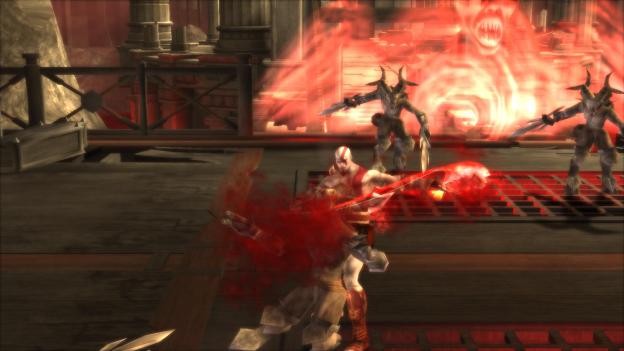
Hi. My name is Ryan, and I’m a God of War addict. I can’t help it, I love the series. The setting, the stories, and especially the play controls are among the pantheon (see what I did there?) of games for me. But I do not own or have access to a PSP, which meant that I was forced to stare longingly at the two PSP-only God of War titles, God of War: Chains of Olympus and God of War: Ghost of Sparta, that were released in 2008 and 2010, respectively. But thanks to the popularity of the series (and no doubt spurred by Sony’s affinity for diving through Scrooge McDuck-like vaults of money), both games have been HD-ified and will soon be released as the God of War: Origins Collection on the PS3.
We will have a full review of the Collection on August 29, but for those poor PSP-less souls that like me, have a love of all things Kratos, we offer this meager preview up to the gods.
The first thing you need to realize about the games of Origins is that they are still originally PSP games, despite the remastering. The previous God of War Collection featured the original PS2 games with a new PS3 shine on the gameplay graphics. The cinematics retained their PS2 look, but the game was still about 90-percent updated to look stunningly awesome. Origins looks good, but the graphics are not on the same level as the Collection. They are passable, but not amazing, and the limitations of the PSP somewhat cripple the epic scope that the games are famous for, but only a little. Both titles were also developed by Ready at Dawn Studios rather than original developer, SCE Santa Monica Studio, which may scare some.

Of the two, Ghost of Sparta clearly is better served by the upgrade. Chains of Olympus suffers early on from bland looking settings and generic enemies that aren’t helped by the graphics, which aren’t close to the last God of War collection. There are also a few technical limitations from the PSP which are ported over, including enemies that will simply stand there until you come close enough to trigger their programming. You will also see enemies suddenly appear through solid walls, here and there, a la Kitty Pryde of the X-Men. But these are minor annoyances, and both the graphics and setting improve as the game becomes more varied and steeped in the mythology of the setting. After a few dozen bloody kills, the gameplay becomes the dominant focus, and combined with the story, you can easily overlook the dated graphics.

By comparison, Ghost of Sparta is a fairly solid transfer. On the PSP, the game was a huge advance over the original, so it isn’t a major surprise that it fares better than Chains of Olympus. But beyond that, developer Ready at Dawn seemed to find their comfort zone much earlier in this title. Chains of Olympus is an original story, but when it begins, it feels like a retelling of the first PS2 game with Attica replacing Athens. It isn’t until later that the game really takes off. Ghost of Sparta is a bit quicker to the punch, as you start off the coast of Atlantis, then find yourself in the chamber of the god of death, Thanatos. How can you not like that? The graphics in Ghost of Sparta aren’t at God of War 3 levels, by any means, but they do look close to some early PS3 launch games. Regardless, the game plays a God of War game, and the graphics are good enough to suck you back into the world of Kratos for two new (ish) adventures.
For those that aren’t familiar with the PSP games, both games are set during the continuity of the existing series, and they are both side tales that don’t further the plot, but rather expand on it. In Chains of Olympus, Kratos is still in the service of the Olympians, and is tasked with sending a message to the Persian armies invading the city-state of Attica. The message is, of course, a bloody one. Wiping out an army is just a light workout to Kratos, who barely breaks a sweet in the effort. But when the sun falls from the sky and plunges the world into darkness, it is up to Kratos to kill the appropriate gods and murder the sun back into the sky.
In the second title, Ghost of Sparta, Kratos is living large as the new God of War when he decides to find his brother Deimos, who was captured by Ares as a child. Along the way, Kratos sort of destroys a city, kills ancient monsters and generally cuts a bloody swath across Ancient Greece.
All the trappings of the God of War series are present in the Collection, and fans of the franchise that haven’t already played the games should rush out to pick up Origins when it is released on September 13. And while the graphics may not live up to the standards of the other God of War games in the series, they are easily good enough to justify the purchase, especially at the discounted $39.99 price. We’ll return with a full review at the end of the month.


